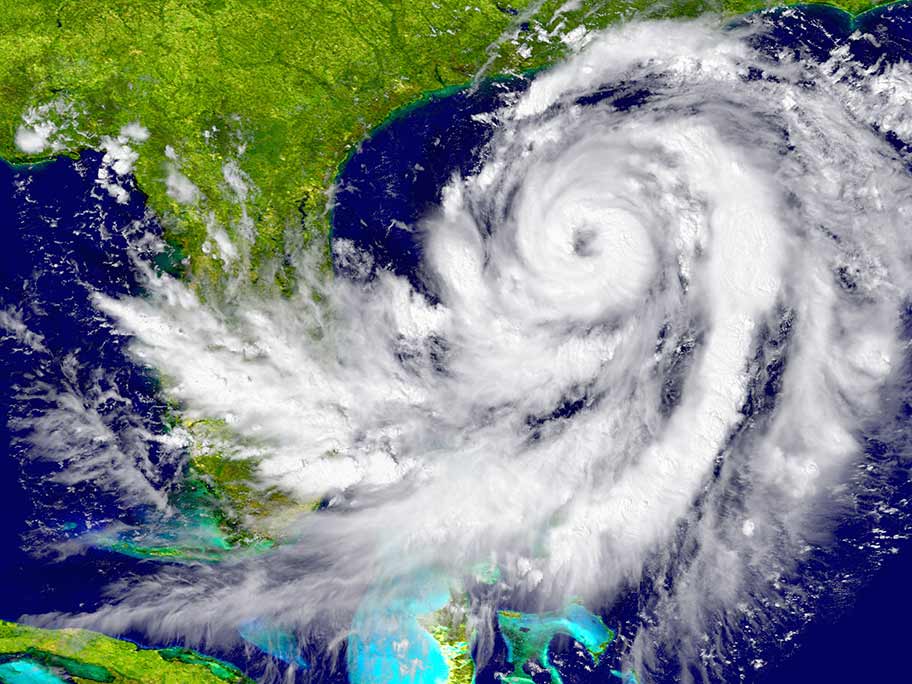
Hurricane watch: Could coastal storms cost your community?
In the news
Hurricane Hermine lingers in the Northeast this week after making landfall last Friday and causing damaging storm surge, strong winds and heavy rain from Florida to the coastal southeast states. As of Tuesday, the storm had taken three lives, damaged property and knocked out power for hundreds of thousands of residents. Meanwhile, Hurricane Newton drove across Mexico en route to the Southwest.
Back story
Climate change may be compounding the widespread flooding that followed Hermine, according to researchers. There’s likely more of the same to come: North Atlantic hurricanes have increased in intensity, frequency and duration since the early 1980s, and climate models project an increase in the strongest hurricanes by late this century. While the science around global warming and storms is complex, experts expect a likely increase in intensity of wind and rain from future hurricanes. Estimates suggest that within 15 years, the annual cost of hurricanes and other storms will total $35 billion.
Adaptation angle
Preparation for worsening storms, in large part, means the prevention of flooding, especially from surging ocean waters that can erode beaches, damage coastal infrastructure and take lives.
Questions to ask
- For coastal communities, what are the specific risks of intensifying hurricanes? What is your area doing to protect against those impacts?
- Are large sections of your community’s population at risk, for instance, because they live in vulnerable, low-lying areas prone to flooding?
- What can residents do to better prepare for and be safe during hurricanes? Do families need disaster supply kits and emergency communication plans?
- What emergency evacuation procedures are in place for your area, and how well are they communicated to residents? How well are emergency responders prepared for rescues?
- How vulnerable is coastal property in your area, whether residential or commercial?
- What can residents or businesses do to secure buildings, such as retrofitting windows, installing power generators or building safe rooms? What are the hurricane or flood insurance considerations?
- How are local infrastructures like roads and public transit, power grid, and water treatment facilities hardened against the impacts of hurricanes and storm surge?
- What is the risk of potential damage to natural coastal areas that provide important ecosystem services, such as wetlands that serve as fish hatcheries?
- If tourism is part of your area’s local economy, how will hurricane activity affect visitor numbers? And if beach-related tourism is big, what will be the impact of ongoing beach erosion from storm surge?
Reporting resources
Dig deeper on the hurricane story using storm-related resources in the database of the Reporter’s Guide to Climate Adaptation.
- Get an introduction to storm surge and general information about U.S. hurricanes from the U.S. National Oceanic and Atmospheric Administration. Access NOAA’s severe weather and storm events database via its weather and climate toolkit. Also, get news about the latest hurricane-related research from Climate Central (search the “hurricane” category on its news page).
- Check out hurricane emergency preparation recommendations from FEMA and learn about what makes for resilient communities in the wake of a hurricane.
- See how transportation disruptions from storm surge are being addressed by the U.S. Federal Highway Administration, and review estimates of worst-case coastal storm surge scenarios for water utilities from the Environmental Protection Agency.
- Calculate economic impacts of hurricanes with the Risky Business Project, which foresees tens of billions in annual average losses in the United States.
- Learn about U.S. coastal resilience and recovery projects in the wake of Hurricane Sandy from the U.S. Fish & Wildlife Service and the U.S. Army Corps of Engineers.
- Take a deep dive into details of community resilience planning for hurricanes, such as an e-book about New York’s post-Sandy strategies, Louisiana’s coastal master plan after Katrina and a report on Florida’s response to storm surge and hurricanes.
- Explore 14 cities around the world that face the threat of hurricanes using the 100 Resilient Cities site.
- Learn which countries suffer most from extreme weather events like hurricanes with the Global Climate Risk Index, produced by the Group of 7 leading nations’ New Climate for Peace Project.
Plus, see our recent news backgrounder on the flood-ravaged Southeast.
Know of other hurricane-related resources we should have in our database?
- Share your resources.
- Share your hurricane adaptation stories and story angles.
